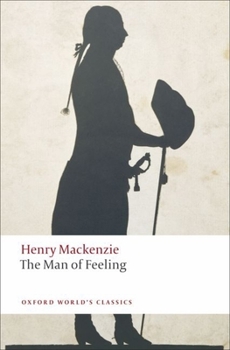The Man of Feeling
Select Format
Select Condition 
Book Overview
Mackenzie's hugely popular novel of 1771 is the foremost work of the sentimental movement, in which sentiment and sensibility were allied with true virtue, and sensitivity is the mark of the man of feeling. The hero, Harley, is followed in a series of episodes demonstrating his benevolence in an uncaring world: he assists the down-trodden, loses his love, and fails to achieve worldly success. The novel asks a series of vital questions: what morality...
Format:Paperback
Language:English
ISBN:019953862X
ISBN13:9780199538621
Release Date:August 2009
Publisher:Oxford University Press
Length:160 Pages
Weight:0.31 lbs.
Dimensions:0.4" x 5.0" x 7.6"
Customer Reviews
2 ratings
The Man of Feeling
Published by Thriftbooks.com User , 21 years ago
Henry Mackenzie's 1771 novel, "The Man of Feeling," is a preeminent locus of a number of mid-to-late eighteenth-century discourses: sentiment, sensibility, sympathy, and moral philosophy. A fragmentary work, "The Man of Feeling" is ostensibly a biography of one Mr. Harley, written in tribute by his friend Charles, and put together by an anonymous editor. Harley is a man of the lesser gentry, propertied, but not wealthy. His greatest concerns revolve around his heightened ability to sympathize with and bring comfort to people in distress. The multi-layered framework of the narrative places its readers at an interesting distance and requires us to judge the various narratives, and the protagonist, for ourselves. The novel begins somewhat abruptly with an introduction, in which the manuscript of "The Man of Feeling" is discovered on a hunting expedition - a village curate has been using its pages as wadding to stuff ammunition into his gun. Immediately we are assaulted by the notion that this man of the cloth has little regard for the work that we are about to start reading. Already, the hermeneutic that we use to interpret Harley and his sentimental adventures is split - are we as readers expected to sympathize ourselves with Harley, or to regard him in the callous manner of the curate? The editor, who rescues the work from its ignominious fate, seems to think otherwise - and presents us with 19 chapters (which are non-continuous) and a handful of fragments sometimes accompanied by his own interjections. What results is a hodge-podge of scenarios in which Harley encounters people in really pitiful states. His attempts to assist the insane, the indigent, prostitutes, decrepit soldiers, prisoners, fortune tellers, and his conjectures on the practice of slavery give us more a sense of character studies and views of human interaction than any kind of real plot. Through these scenarios, Mackenzie examines social, political, and economic issues, as well as a range of gender relations within those frameworks. Also, the more I immerse myself in sentimental fiction, the more I wonder what the role of travel is supposed to be in the genre. Harley is goaded by his aunt, and one of his neighbors, Mr. Walton (who is also father of his primary love interest), to make a voyage to London in search of a property grant to extend his own fortunes. Of course, much like any cautionary eighteenth-century tale in which a naive young country woman ventures into the degraded metropolis of London, Harley's London expedition is a series of misadventures and rude awakenings that further cause us to question the role, the usefulness, the propriety of excessive sensibility. Can a pure Man of Feeling coexist with the modern world, or is he an anachronism whose time has never and will never exist? Is a modicum of self-interest necessary for survival in the social world?Finally, Mackenzie's novel asks us to consider the place of sympathy and sentiment in a larger g
A gem from another worldview
Published by Thriftbooks.com User , 23 years ago
This novel provides so many of the pleasures of reading a book from another era and another sensibility. Within 115 pages there are no fewer than 49 separate episodes of weeping, where exchanging tears produces further exchanges, usually monetary -- as with the narrative of the mad woman in Bedlam, whose story moves Harley so much that he leaves a large sum of money with the keeper of the madhouse. Do not read this expecting a modern novel; but do read it -- and read it not only expecting pleasure, but also expecting to be taught more about the late eighteenth century psychology than you've ever been taught before.





